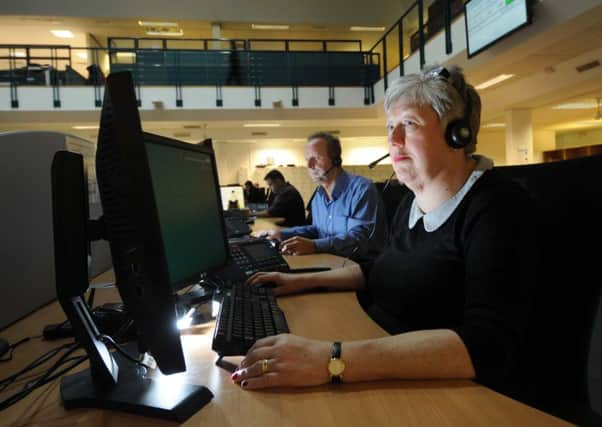Callers give up on 111 line as winter struggles bite


The ambulance service, which runs the 111 number, faces a penalty worth around £316,000 and will follow a remedial action plan after missing four key government targets over the winter.
Bosses at the North West Ambulance Service (NWAS) said they are confident of bouncing back from a difficult few months, which saw just six in 10 calls answered within 60 seconds against a national target of 95 per cent.
Advertisement
Hide AdAdvertisement
Hide AdRegional manager for the 111 service, Ian Moses, said: “It has been a challenging time for the service as it has been for the NHS nationally, but ensuring appropriate patient care and clinical safety at all times have remained our top priorities.
“Our aim is to deliver a stable and efficient NHS 111 service in the north west. We have firm plans and processes in place to ensure we will return to doing that, and we will continue to drive improvements for the benefit of both service users and staff.”
Almost half the patients surveyed by NWAS recently said they would have dialled 999 or gone to A&E if the 111 service was not available.
But in December and January, 15.6 per cent of calls were abandoned, against a government target of under five per cent. In February, it was 14.9.
Advertisement
Hide AdAdvertisement
Hide AdAnd the number of calls picked up within 60 seconds was 55.22 per cent in December, 55.7 in January, and 58.2 in February.
From 1 April 2015 until the end of last month, it answered 75 per cent of calls within a minute, below the government’s target of 95.
The service also fell short of a third target, which says 75 per cent of patients waiting for a call-back should get one within 10 minutes.
In December, just 35.61 per cent did. In January, the figure was 38.83 per cent, and in February it was 33.5 per cent.
Advertisement
Hide AdAdvertisement
Hide AdAn NWAS spokesman said: “Winter is the busiest time of year for the NHS 111 service.
“In recent months the service has experienced variations in demand and the patterns of demand, which has impacted performance during peak times.This is both due to an anticipated seasonal increase in call volume but also the effect of extreme weather conditions affecting many parts of the region and nationwide, resulting in pressure across the healthcare system and, in turn, leading to unprecedented demand for our service.”
The service sees calls spike in the early evening, when GP surgeries close but out-of-hours services have yet to open, the spokesman said.
Up to 450 calls can be made within the hour, with 250 made within just a 15 minute period, they added.
Advertisement
Hide AdAdvertisement
Hide Ad“We could need 150 staff for that 15 minute period but only 80 either side of it.
“That has been a challenge but we have learnt from it. We have been using an industry-standard model to determine staff rosters against expected call volume, but have now implemented a solution which is providing us with the ability to plan more refined rosters for peak periods.”
Extra advisors and clinicians have now been hired, a new website set to act as a ‘one-stop’ resource for patients will launch this month, while a new rota system has been introduced. A cap on agency staff, which came into effect at the end of last month, is not expected to pose a problem because agency spending makes up ‘only a small part’ of its overall staffing bill.
NWAS said the action plan, which was put in place at the end of January, was mutually agreed with Blackpool Clinical Commissioning Group (CCG) and will remain in place until the end of May.
Advertisement
Hide AdAdvertisement
Hide AdA spokesman for Blackpool CCG said: “In recent months the NHS 111 service has experienced exceptional call levels in line with all emergency and urgent healthcare services over winter.
“We believe most of the callers to the NHS 111 who abandon an initial call will reattempt to call the service.
“NWAS has undertaken some analysis of abandoned calls which demonstrates this is the case.
“To support the return of performance to contracted levels, Blackpool CCG has worked with NWAS to put in place a remedial action plan that focusses on staffing levels, planning of resources, and management of absence due to sickness.
Advertisement
Hide AdAdvertisement
Hide Ad“The 111 service is now showing significant signs of improvement and we expect contractual performance levels to be achieved in the near future.”
Pat Oliver, director of operations at Blackpool Victoria Hospital, said: “There has been a rise in A&E attendances recently but we know there are many reasons for this.
“The NHS 111 number remains a vital component in the Fylde coast health economy’s Think! Why A&E? campaign to help patients get the most appropriate treatment and we would urge people to use the service if they urgently need medical help or information when their situation is non life-threatening.”